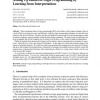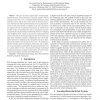11 search results - page 1 / 3 » Inductive Logic Programming for Structure-Activity Relations... |
117
click to vote
SAINT
2005
IEEE
15 years 8 months ago
2005
IEEE
Inductive Logic Programming (ILP) is a combination of inductive learning and first-order logic aiming to learn first-order hypotheses from training examples. ILP has a serious b...
127
Voted
CORR
2000
Springer
15 years 2 months ago
2000
Springer
When comparing inductive logic programming (ILP) and attribute-value learning techniques, there is a trade-off between expressive power and efficiency. Inductive logic programming ...
126
Voted
EUSFLAT
2009
15 years 9 days ago
2009
Abstract-- This paper presents an approach for visualizing highdimensional fuzzy rules arranged in a hierarchy together with the training patterns they cover. A standard multi-dime...
129
click to vote
ILP
2004
Springer
15 years 8 months ago
2004
Springer
Many domains in the field of Inductive Logic Programming (ILP) involve highly unbalanced data. Our research has focused on Information Extraction (IE), a task that typically invol...
110
click to vote
BMCBI
2006
15 years 2 months ago
2006
Background: Microarrays used for gene expression studies yield large amounts of data. The processing of such data typically leads to lists of differentially-regulated genes. A com...


